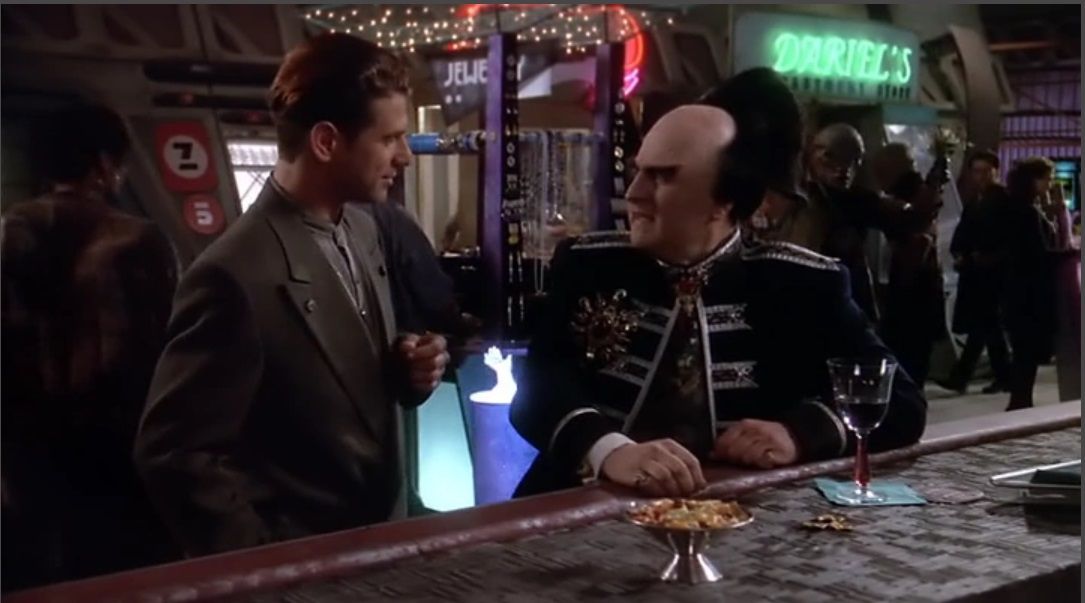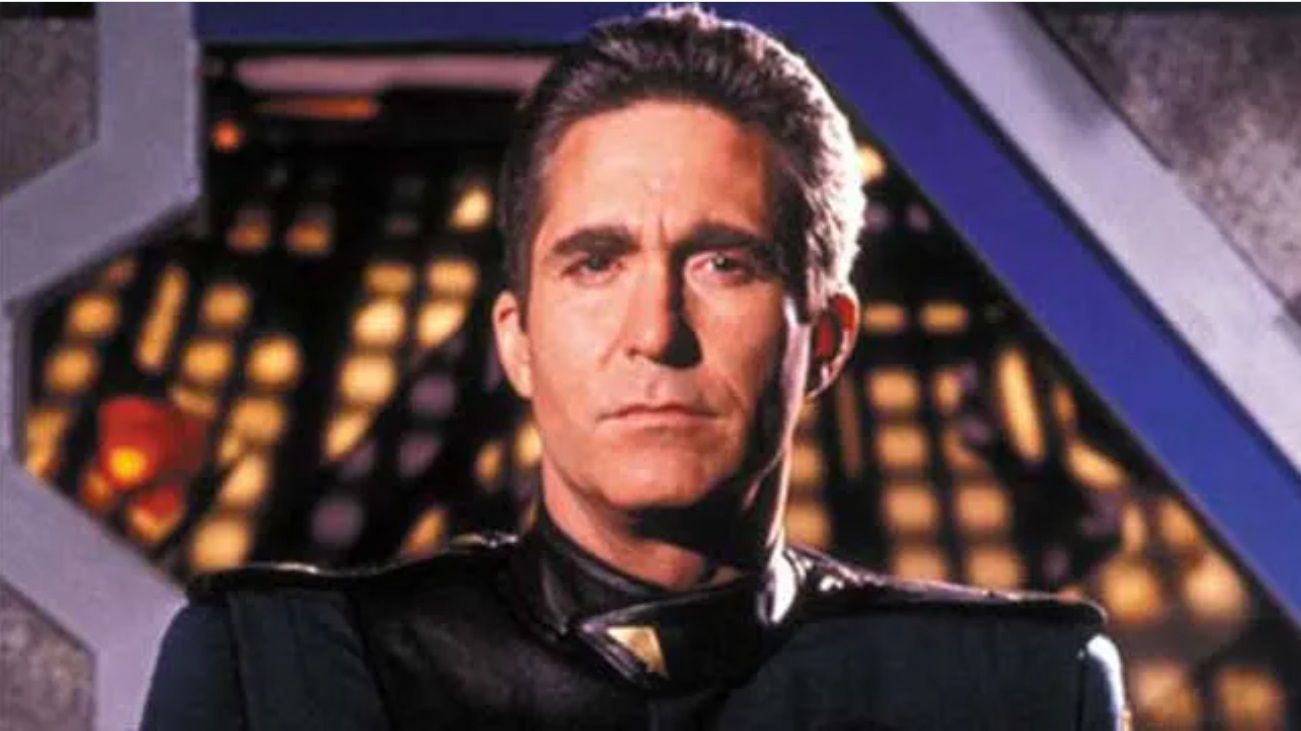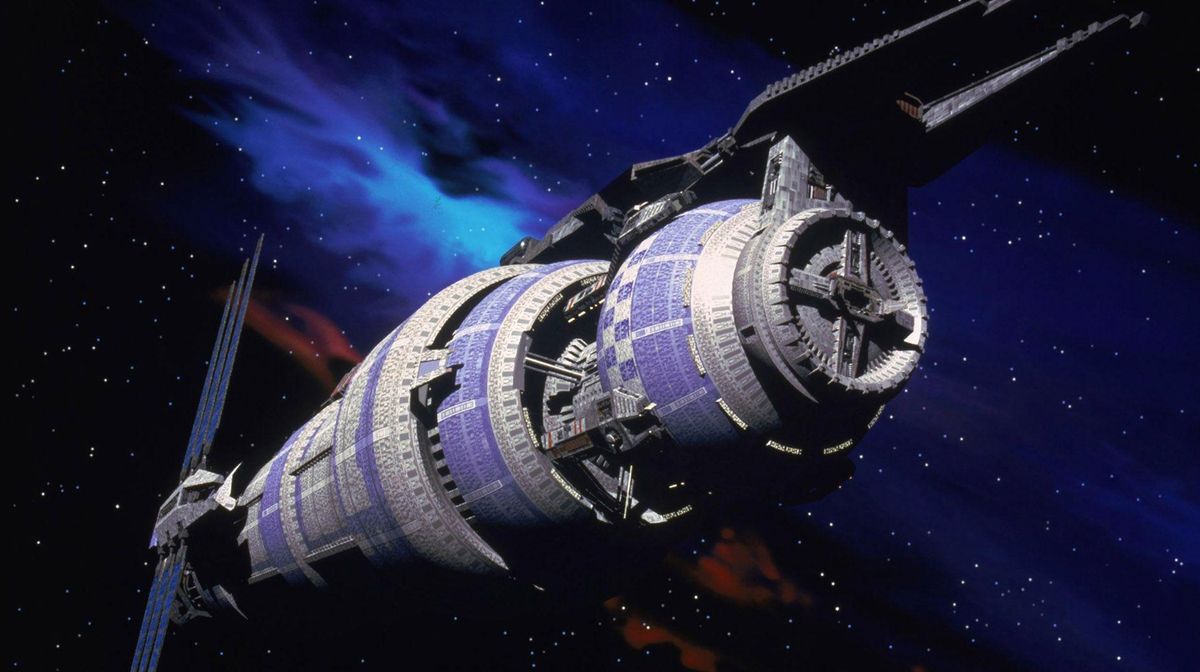Originally hitting the airwaves in 1993, Babylon 5 ran for five seasons and 110 episodes. It also happens to be one of the best science fiction television series ever made.
Granted, I say that as a fan who has loved it for years. I first fell in love with it as an early 2000s teen watching reruns on the Sci-Fi Channel. Every single rewatch since then has only served to convince me that it’s still the best of its sort ever made.
Babylon 5 delivered a sweeping space opera that is equal parts grounded and fantastical. Its heroes are believably human and larger than life. Its villains range from petty thugs to ancient evils manipulating the galaxy across millennia. It has everything from romance and war to betrayal, faith, friendship, and redemption.
Every time I hit the final episode, I feel like I’ve been on a long and fulfilling journey. In thirty years since, the world of television has never produced anything else quite like it.
What is Babylon 5 any ways?
The brainchild of writer J. Michael Straczynski, Babylon 5 takes place in a future where humanity has reached the stars and were nearly wiped out for their trouble. A chance encounter with an alien race known as the Minbari leads to a violent misunderstanding and a devastating war.
In the aftermath, Earth’s government, along with the Minbari and other aliens races, build a space station where they can meet, learn more about each other, and find peaceful resolutions to their conflicts. The station is named Babylon 5.
The series follows the crew of the station as they struggle to navigate conflicts ranging from cultural misunderstandings to full-blown interstellar wars. They do all of this while never losing sight of their original mission: bringing peace to a galaxy hellbent on tearing itself apart.
Babylon 5's season one intro.
Creativity Born from Limitation
When J. Michael Straczynski first conceived of Babylon 5, it was born from a desire to execute a new kind of narrative grounded in science fiction television. Speaking about the show, he described his early thought process.
“I loved the sagas, the huge cycles: Foundation, Childhood's End, Lord of the Rings, Dune, and kept wondering, ‘Why hasn't someone done this for TV?’” To which the only answer is, 'Nobody's tried.'"
It wasn’t that the era hadn’t seen any successful sci-fi shows. Star Trek: The Next Generation, for instance, started its iconic and successful TV run in 1989. Star Trek: TNG and its contemporaries, however, tended to follow a more episodic approach to storytelling. There might be the occasional two-parter or cliffhanger, but most episodes were designed to tell a compete story in an hour or less.
With Babylon 5, Straczynski imagined a TV series where each episode was part of a single ongoing story that would unfold over the course of multiple seasons. That’s a notion that’s fairly common today. In the early 90s? It was the sort of idea that got you laughed out of network pitch meetings.
Straczynski was persistent though, and, perhaps more importantly, took a pragmatic approach toward the structuring of his grand epic. He had worked on sci-fi television before and had seen firsthand how ballooning costs could kill a promising show. The very idea to base Babylon 5 on a space station was born from a desire to cut down on costs.
By limiting it to one primary location, Straczynski would be able to reuse a handful of sets repeatedly. And whenever the need arose for someplace new? Babylon 5 was economical in its approach to sets. The show was filmed off of major Hollywood lots and employed green screens and CGI to portray many of its more ambitious alien environments.
The show also had more than its fair share of scenes that took place in non-descript shadowy rooms - relying on its plot and performances to carry its story when sets had to stay simple.

This approach helped keep the costs per episode (around $800,000) to nearly half of what competing series like Star Trek: Deep Space Nine was spending - a fact that helped Babylon 5 survive when a more expensive series might have been canceled. It also helped the cast and crew in less tangible ways, as well.
“We always prided ourselves on being ‘the little space station that could,’” said lead actor Bruce Boxleitner, in a 2021 interview. “We were off in North Hollywood in an old hot tub factory shooting this. We weren’t on a major studio lot…. We felt outside the system there, and it worked for us.” He continued. “We had to make due with what we had and I think this is where the real creativity came in.”
The pragmatism of Babylon 5 extended beyond just budgetary concerns. Having seen how losing actors had tanked TV series in the past, Straczynski worked to ensure the show could weather and survive even the most dramatic of cast shake-ups.
“As a writer, doing a long-term story, it'd be dangerous and short-sighted for me to construct the story without trap doors for every single character.”

Straczynski pre-planned potential plot exits of all of the story’s major characters - a piece of foresight that was utilized at several points throughout the show’s run. Most notably, the series’ original lead Michael O’hare departed at the end of season one. His character’s disappearance becomes a major plot point/mystery that unfolds across the next several seasons, before finally gettingresolved in the Season Three two-parter “War Without End.”
What made Babylon 5 so special?
Setting aside the fact that Babylon 5 is probably one of the best-planned sci-fi series ever made… it can be hard to pin down one single reason for why Babylon 5 is, on the whole, such a special piece of fiction.
Even with all of J. Michael Straczynski’s preparation, the show isn’t perfect. The first season is notoriously slow-paced. Its fifth and final season, meanwhile, is often remembered as being a bit half-baked and out of place. (I would argue Season Five's reputation is a bit overblown. It actually works well as an extended epilogue to earlier parts of the show.)
There are also elements of the show that have aged poorly with time. Babylon 5 featured some of the most impressive space battles of its time, but it also relied on mid-90s CGI that looks primitive nearly thirty years later.
Whatever its flaws might be, however, there’s a richness to Babylon 5 that just adds up to something uniquely fulfilling when taken altogether.
Ambassador G'Kar responds to the surrender of his people to the Centauri Republic.
While it’s true that Season One is slower, it’s also never bad. Its early episodes lay down the foundation for many of its biggest plot beats and character arcs. These are the episodes where you learn about pillars of the story like the Earth-Minbari War and the ongoing conflict between the Narn and Centauri. Beloved characters like Delenn, G’Kar, and Londo, and Ivanova find their feet in this first season - taking steps toward the people they’ll grow into as the story (which encompasses years of in-universe time) proceeds.
The front-end work the show does gives more meaning to a lot of the big events that come later. Perhaps the best example I can think of is the Season Three episode Severed Dreams. This is one of the show's most beloved episodes and home to easily its most iconic moment.
With Earth falling under the control of a brutal fascist government, Babylon 5’s commander, Captain Sheridan (portrayed by Bruce Boxleitner), declares the space station’s independence. A ferocious battle soon ensues, as the station and its allies fend off Earth warships sent to seize control. It appears that all is lost when, suddenly, Delenn and a fleet of Minbari ships jump in to intervene.
This is about as perfect a moment as you’ll find in any TV series anywhere. It’s great because epic space battles are cool. It’s great because actor Mira Furlan delivers a stirring performance and scathing monologue as the Minbari Ambassador Delenn. Most of all, however, it’s great because the show has taken the time to establish just how much it means for the Minbari to show up at this specific moment to help this specific man.
Mira Furlan's Delenn arrives to rescue Babylon 5.
Sheridan isn’t just the commander of Babylon 5. He’s a veteran of the Earth-Minbari war and the man who destroyed one of the Minbari’s most famous warships. The show, prior to all of this, went through pains to set up just how much the Minbari hate him. Their willingness to defend Babylon 5 in his moment of greatest need is a testament to the relationship he’s built with them, and Delenn.
Babylon 5 is littered with arcs and moments like this. It’s a show full of poignant character moments delivered by top-notch actors, many of whom are giving career-best performances.
The world of Babylon 5 also just feels impressively real.
Don’t get me wrong. This is still a science fiction series through and through. There are spaceships and laser beams and alien races galore. It also has a streak of fantasy to it, drawing heavy inspiration from works like The Lord of the Rings.
The characters, governments, and factions that inhabit the show, however, are realistically drawn and relatable.
Babylon 5 doesn’t approach its story with a utopian view of humanity’s future, a la something like Star Trek. Humanity is still divided and flawed in Straczynski’s vision of the year 2257. Many of the issues its characters face are mirrored in our own world today. Anyone watching present-day American politics or who lived through the “alternative facts” landscape of the Trump era will find struggles they can empathize with in Babylon 5.
And yet, at the same time, Babylon 5 is optimistic about we could become. At the heart of its story is the idea that we don’t need to keep doing things the way we've always done them. We can build a better future by working together, even if it’s hard. That it all unfolds in a true-to-life fashion makes it all the more inspiring.
The Legacy of Babylon 5
Unlike monoliths like Star Trek or Star Wars, Babylon 5 is largely a cult favorite. Several spin-offs were attempted after its five-season run ended, but they failed to find traction and the franchise largely fizzled out. Sadly, in the years since, many prominent members of its cast have also passed away. Co-lead Mira Furlan died in 2021, from complications related to the West Nile Virus.
Even so, nearly thirty years after it began, Babylon 5 is still beloved by its fans and continues to expand with new releases. An animated film -Babylon 5: The Road Home- was just released this year in 2023. Creator J. Michael Straczynski also remains committed and devoted to the series. A potential reboot was announced a few years ago, set to air on the CW, and appears to still be in development.
For my own part, I’m not sure how much a new take on this classic would appeal to me. At the end of my most recent rewatch, my first thoughts were just how different it is from the television being filmed today. The way it was made and the way it was written - it feels like a product uniquely of its time.
Even if another version of the show is ever released, I have no doubt my affections will stay with the original. I connected with it in a way that I don’t think a new version -well done or not- could ever hope to replicate. It's the same way for a lot of its biggest fans. Not bad for the "the little space station that could."
Babylon 5 is currently available to watch for free on Tubi.

